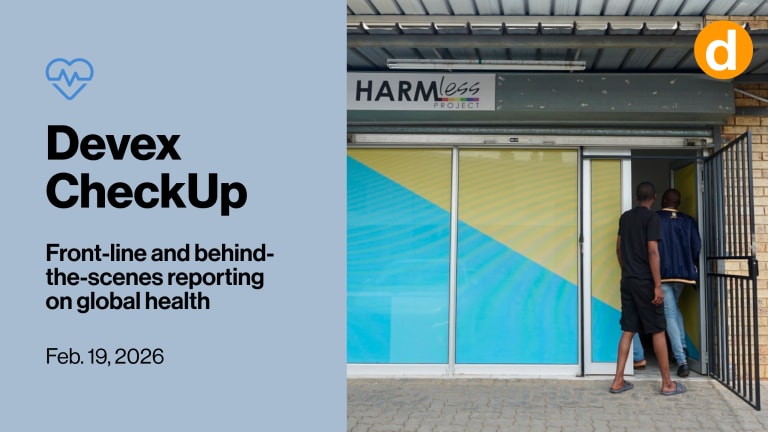
The COVID-19 pandemic has made clear the risks for African countries of importing 99% of the vaccines administered to their populations. The continent’s health leaders say the vaccine production and supply chain situation needs to change. But will it?
In April 2021, the Africa Centres for Disease Control and Prevention launched the Partnerships for African Vaccine Manufacturing, which aims to build capacity across the continent so that by 2040, 60% of all vaccines used on the continent are produced within African nations.
This is a preview of Newswire
Sign up to this newsletter for an inside look at the biggest stories in global development, in your inbox daily.
But 2040 is a long way off. In the meantime, here’s a quick rundown of the announcements that have been made about COVID-19 vaccine production in Africa — courtesy of my colleagues Jenny Lei Ravelo and Sara Jerving.
South Africa:
• Aspen Pharmacare reported that, as of last month, it had partially produced 120 million doses of the Johnson & Johnson COVID-19 vaccine. Aspen announced in October that it aims to increase production to 1.3 billion doses per year.
• In July, Pfizer signed a letter of intent with the Biovac Institute to partially manufacture its COVID-19 vaccine for distribution within the African Union.
• In June, the World Health Organization and its partners announced the creation of a technology transfer hub for messenger RNA COVID-19 vaccines. The hub aims to develop a replica of Moderna’s vaccine — though it will do so without Moderna’s involvement. The silver lining, according to optimistic experts, is that the full vaccine development process will take place in Africa.
Rwanda and Senegal:
• In October, the two countries signed an agreement with BioNTech to create full production, mRNA vaccine manufacturing facilities under license, with construction planned to start in mid-2022.
Egypt:
• The country is producing its own COVID-19 vaccine, named “COVI VAX,” which has started phase one clinical trials.
• Egypt is also producing doses of Sinovac, and an Egyptian manufacturer has agreed to produce Russia’s Sputnik V vaccine.
Read: Prospects for local manufacturing of COVID-19 vaccines in Africa
+ For more content like this, sign up for Devex CheckUp, the must-read weekly newsletter for exclusive global health news and insider insights.
Money talks
In a letter to the boards of Pfizer, Moderna, AstraZeneca, and Johnson & Johnson, asset managers worth more than $3.5 trillion wrote that pharmaceutical companies should tie management salaries to the equitable distribution of COVID-19 vaccines around the world, according to the Financial Times.
The large number of people in the world who remain unvaccinated makes it very likely that the omicron variant will not be the last one that challenges government response efforts, WHO warned Thursday.
WHO: Omicron 'unlikely' the last COVID-19 variant
Lies and statistics
Official government statistics put India’s COVID-19 death toll at just over 480,000. A new study published in Science finds the actual number of COVID-19 deaths is likely closer to 3 million, a number one aid expert called “almost literally unfathomable.”
Meet the new boss
Looking for a new job this year? How do you know if the organization or employer you’re considering is a good fit?
For our Career Account members, Justin Sablich has a great set of tips for gathering the information you need to find the right role in the right work environment. And yes, you should start by making a spreadsheet.
Read: 5 tips for finding the right employer in 2022
+ Sign up to Devex Career Hub for global development’s top jobs, expert career advice, and practical tips to help you do more good for more people.
Breakdown
The U.K. government included conflict prevention as a strategic goal in its Integrated Review last year. Then it cut £348.9 million ($472.7 million) from the Conflict, Stability and Security Fund. A new analysis details how those reductions were distributed within the cross-government body.
Read: Impact of funding cuts to UK's CSSF revealed
Just words?
“Is the megaphone of large global health entities drowning out the voices of the affected people who should be at the center of this conversation?”
— Dr. Vineeta Gupta, director, ACTION SecretariatWith massive disparities in global COVID-19 vaccination rates, interest in health equity is soaring. It has been for the last few years, writes Gupta, who worries that the term is “being hijacked by the very same powerful forces that perpetuate disparities.” The increased attention is good, but who is setting the agenda?
Opinion: Avoiding the colonization of 'health equity'
Alternate universe
If International Monetary Fund Managing Director Kristalina Georgieva had resigned over her alleged role in the World Bank Doing Business report scandal, her position would have been filled by the fund’s first deputy managing director, currently former Trump administration Treasury appointee Geoffrey Okamoto. In that hypothetical world, the World Bank (David Malpass), the Inter-American Development Bank (Mauricio Claver-Carone), and IMF would all have been led by former Trump officials.
Last month Georgieva announced that Gita Gopinath will shift from chief economist to first deputy managing director in the next few weeks. “The United States, the largest shareholder in the IMF, welcomed the pick of Gopinath,” Reuters reported.
+ Catch up on our coverage of last year’s Doing Business scandal, including an article for Pro subscribers on the future of Doing Business. Not yet a Pro subscriber? Sign up now and start your 15-day free trial.
In other news
The number of people with dementia could reach 153 million by 2050 due to a growing, aging population, but an unhealthy lifestyle is also a factor, according to experts. [BBC]
The Australian government, which has already given 17.5 million COVID-19 doses, is on target to provide 60 million doses to low-income countries by the end of the year. [Sydney Morning Herald]
An airstrike on a refugee camp in Tigray killed three Eritreans, including two children, and injured four others. [UN News]
Sign up to Newswire for an inside look at the biggest stories in global development.








